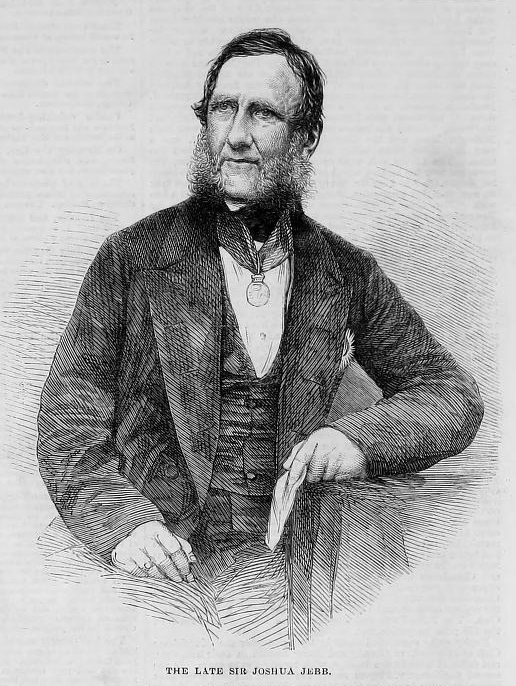

Sir Joshua began his career as a Second Lieutenant in the Royal Engineers. His military career flourished in the twenty-five years between 1812 and 1837 when he became First Captain. This same year he was appointed Surveyor-General of convict prisons, in order to provide technical advice on the building and improved of these institutions. He worked with others on the building of the model prison at Pentonville whilst continuing his military duties until 1839 when he was seconded into civil service – where he remained for the rest of his career.
Jeb sat on several committees and designed multiple prisons, and was eventually rewarded with an order of the bath for his distinguished service to the state.
Eventually being known by the distinguished title of Major-General Sir Joshua Jebb, he contributed to the plans for Woking Invalid Convict prison very heavily. And one of his most famous works “Reports and Observations on the Discipline and Management of Convict Prisons” was referred to for many years after his death in 1863.
He was buried at Brookwood cemetary – where in years to come he would be joined by many of the inmates of the Woking penal system.
Reports and Observations on the Discipline and Management of Convict Prisons
This fundamental work, was initially expected be a report to the government. Unfortunately this was impeded by the untimely death of Sir Joshua himself.
After much discussion it was decided that whilst the document could not be accepted as a report (perhaps due to the unknown possibility of post-mortem tampering) permission was granted for the document to be published publicly instead.
This document gives us a brilliant understanding of Sir Joshua’s intent with regards to his latter prisons, not least of all Woking. His friend in the introduction states clearly that “He knew that punishment must and ought to contain suffering”, a term that fills our modern bleeding hearts with dismay.
The introduction goes on to state that Jebb was not a fan of licencing prisoners, preferring to maintain the penal seclusion. He appears to have felt these early releases were more likely to return to vice and corruption. However we must take this with a pinch of salt, and a healthy dose of scepticism as the foreword is not from Jebb himself, but another entirely unknown gentleman, with unknowable goals.
Before we dive headfirst into this very large document, we should first define the current prison systems.
English System (Separation system)
Irish System – a system of prison management developed for Ireland by Sir Walter Crofton and noted for its mark system and commutation of sentences, classification of prisoners, military discipline, trade and academic training, preparation for free self-control, and release under police supervision.
In the start of his report Jebb waxes lyrical on the issues with the Irish reports, their lack of clarity and the extraordinary number of ex convicts of who travelled abroad immediately afte their release. He appears to argue that it is impossible to agree with the irish system as the evidence on its behalf is curtailed by the inability to track the repeat offenders in this group of travelling convicts.
He argues that the Irish System is one of “Disposal, rather than discipline” He also makes the case that police supervision is not a preventative for new crime, but rather an inducement as it hinders the newly released in their search for gainful employment.
He goes on to provide very illuminating statistics from an 8 year period between 1854 and 1862 on the recurrence of crimes amongst “Ticket of leave” men, 1.3 percent of all murders were carried out by them.
The long book documents multiple letters from Sir Joshua on many and varied topics from diet to punishment. And whilst published posthumously it is considered to be his paramount work.